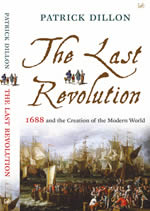The Last Revolution
Patrick Dillon

The Last Revolution of 1688 saw some of the most dramatic events in British history: William of Orange’s invasion with a force four times the size of the Armada; the psychological collapse of the King, James II, his ignominious flight and capture by fishermen; his second escape, stealing away from London by river while a Dutch army marched in through St James’s Park.
It was also one of the most important. 1688 closed the book on seventy years of Civil War and political crisis. Ahead lay a new future for England as trading and maritime colossus, imperial superpower. Ahead, too, lay a new type of politics, with the monarch’s powers curtailed and the rights of parliament established. Englishmen of the following two centuries would date the start of English liberty from 1688.
But these were not the Revolution’s only achievements. It took place against a background of extraordinary social and intellectual ferment. Isaac Newton published his Principia Mathematica in 1687, John Locke his Essay on Human Understanding the year he returned from exile in Holland. The Revolution brought religious toleration. It established the Bank of England, public credit, freedom of the press. England’s first stockmarket bubble convulsed the City, a consumer boom filled London’s streets with adverts and display windows. New clothes and wigs, silks and porcelain from the emerging East all transformed fashions in a craze for the ‘Modern’. From the Revolution of 1688, which encouraged these new developments, emerged a world quite different from any that had existed before: a world based on commercial growth, not land ownership, expanding science rather than religious repression, political freedom rather than autocracy – the world we live in today.
The Last Revolution places the dramatic political and personal story of 1688 in this context, and relates it through the men and women who created it: exiled radicals, and worried traditionalists, scientists and City financiers, journalists, gamblers, actors and entrepreneurs. It tells the story of Henry Purcell, busily creating a new English music, of Huguenot exiles from Louis XIV’s France, of the first feminists who sought freedom inside marriage as well as freedom within the state.
Based on detailed archive research, The Last Revolution will inhabit England in the decade around 1688. It will find the links between a political revolution and the dramatic changes which accompanied it, and so track the birth of a new world.
Book Details:
- Author: Patrick Dillon
- Published Year: 2005
-
Rights Sold
- UK: Cape

Patrick Dillon
PATRICK DILLON was born in London in 1962. Awarded a scholarship to Trinity College, Cambridge, he instead studied architecture in London, and qualified as an architect in 1987. His two crime novels, Truth and Lies, were published by Penguin in 1996 and 1997.In 2002 he combined long-standing interests in history and London with his acclaimed study of the Eighteenth-Century Gin Craze, The Much-Lamented Death of Madam Geneva, published by Headline. Based on lengthy research into original archives, court records and newspapers, Madam Geneva painted a vivid picture of crime, politics and social...
More about Patrick Dillon
Book Reviews
-
"Written with great zest & colour"
BBC History Magazine -
"His prose is elegant, his powers of compression fine. The year 1688 could not ask for a more compelling and confident case with which to re-establish its reputation."
The Times -
".. utterly engrossing and hugely readable...Dillon expertly conjures an extraordinary moment in history..."
Daily Telegraph -
"Patrick Dillon, who is not a professional historian, is an accomplished writer, as not all profesional historians are. His prose is accessible, his material well arranged, his reading wide and observant."
Blair Worden, Literary Review -
"Patrick Dillon's The Last Revolution "This book brings to life the revolutionary world of the late seventeenth century..."
Good Book Guide -
"...excellent, lively account, which uses short chapters that highlight historically obscure personalities to draw the reader into the story...A changed mentality was emerging. In this book its map has been entertainly drawn."
Spectator -
"...this confident, entertaining and illuminating book..."
Sunday Telegraph -
"Lucid and well-written, it effectively captures the world of [the] time with its dramatic incidents and curious characters."
Tom Devine, Scotland on Sunday -
"as a vivid, intelligent retelling of the story it is a huge success. Drawing on a good range of contemporary narrative and polemical writing it captures the passion and danger of the vortex of events around the last revolution"
John Morrill, BBC History Magazine